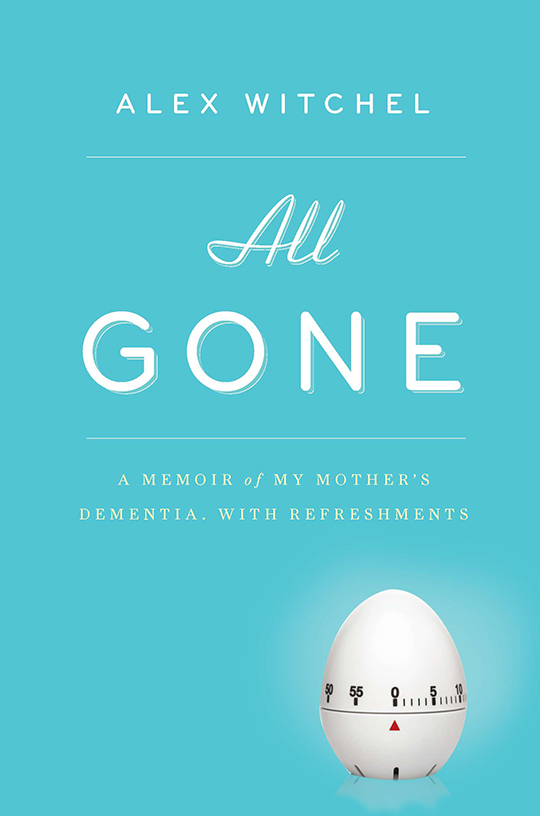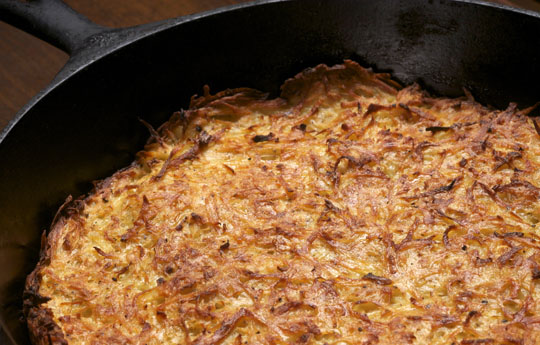I’m an audible memoir junkie. Love to listen to them read by the author. Some are great readers (Mary Karr), some woeful (James Atlas), some as depressing as their subject (Andre Dubus III), some every bit as hilarious as you hoped they would be (Ellen Degeneres, Tina Fey). I recommend every one of these memoirs.
The author and NYTimes reporter Alex Witchel this fall published a second memoir subtitled “A Memoir of My Mother’s Dementia. With Refreshments.”
A memoir of struggle and sorrow and deep grief. With recipes. Witchel reads the recipes. After the first chapter, I honestly didn’t want to listen to the recipe for meatloaf (though I was intrigued by the addition of Corn Flakes). I thought it, like the subtitle, was a gimmicky sales ploy to convince buyers that, yes, it’s a tragic tale, but … WITH RECIPES! Smiley-face emoticon!
It wasn’t till the end of Chapter 2 that the full impact of the food came to the fore. The author’s genuine care of food, not to mention her mother, whose personality is falling through her fingers like sand, made it clear how much of a piece food was of Witchel’s relationship with her mother and with the world.
Witchel’s mother cooked daily for a family of six, but didn’t like it. She embraced convenience food. Minute Rice was a blessing. There seemed to be actual loathing in the Sunday morning eggs she cooked for her four kids, Alex being the oldest. But the food meant a great deal to Alex, so much so that in adulthood she asked her mom to give her the family recipes (“Is there any contract tighter than a family recipe?” Witchel asks).
And when her mother is alive but no longer reachable due to strokes, Witchel finds sadness in cooking the recipes of her life. While the smell of Mom’s meatloaf can actually bring the sound of their 1960s Passaic, NJ, garage door opening, signaling her professor mom’s return home, the cooking is pervaded with sadness.
“These days when I make her food, … smelling the signature mom’s-home aromas that signal safe harbor at the end of the day, it brings her nearer, yes. But even as I imagine her over my shoulder watching me as I used to watch her, I know I am cooking alone. It is not home cooking without the home. She cooked for me because she loved me and wanted to take care of me so I would grow up to be big and strong. And I thought I had done just that until it came time for me to take care of her.”
This sentence is followed by a recipe for Chicken with Prunes, and many others, following the author’s gradual recognition that something is going wrong with Mom and the oncoming work of juggling doctors’ visits, medical decisions, her own complex family, a critically ill younger sister, and a demanding job as a reporter for the paper of record—while Thanksgivings still arrive as scheduled.
It’s a good story overall, filled with a lot of good small ones, such as how she became the writer that she is, how she and her husband, Frank Rich, former Times theater critic and op-ed columnist (it concerns a newsstand and the first time the paper printed the word penis in a non-science story), and helping to raise (and cook for, of course) his two boys, her step-sons (now writers who merit their own coverage in the New York Times).
But in the end everything somehow returns to food and to being together. Witchel even compares writing a profile with preparing an elaborate dinner that is dispatched within minutes.
All Gone is a short, lovely memoir, moving in its description of grief and the loss, the painfully slow loss, of a beloved parent, never self-indulgent and with enough bright spots to balance the blackness, such as the time she proudly taught Martha Stewart how to make her mom’s latkes only to have her moment in the spotlight cruelly snatched away from her. And there is a moment at the end, a remark from her mom during her final conversation with the daughter who did indeed grow up to be very good, and very strong, a comment about decorating that brought me to a full-on weep. Which isn’t necessarily a good thing when you’re driving 70 mph on I-271. We book listeners don’t get to chose our moments when words make us come undone. But it certainly underscores the talents of a really good writer.
Potato Kugel
This is Lois Baron’s kugel, not the Witchel family latkes. I went so far as to email the book’s publicist for the latter, but when I listened to it, it was so similar to the kugel recipe in our Book of Schmaltz, that it was easier to offer that one here. It should go without saying that the Witchel version does not include schmaltz, hardly a convenience food. Though her mother surely would have grown up knowing schmaltz, she’d have eschewed it as an adult. This recipe uses more onion. It’s also far easier than making individual pancakes, and thanks to the schmaltz is surely every bit as delicious Alex Witchel’s latkes. If you don’t have schmaltz, omit it, and simply cook the potato in ¼ cup hot vegetable oil.
- 1 large Spanish onion
- 3 large russet potatoes, peeled and submerged in cold water
- ½ cup/120 grams schmaltz
- 1 ½ teaspoons kosher salt
- 1 ½ teaspoons freshly ground pepper
- 2 large eggs, beaten
- 2 tablespoons/15 grams matzo meal
- Preheat the oven to 400°F/200°C.
- Grate the onion on the medium holes of a box grater. With your hands, squeeze out as much liquid as possible and put the onion in a large bowl. Grate the potatoes. After each potato, put the shreds in a kitchen towel and squeeze out as much liquid as possible, then toss it with the onion to prevent it from turning brown.
- Grease a large skillet or baking dish with a little schmaltz. Add the remaining schmaltz to the potato mixture and toss well.
- Add the salt and pepper to the eggs and beat them some more to distribute the seasoning. Add the eggs to the potatoes and onions, along with the matzo meal, and toss to thoroughly mix everything. Transfer the mixture to the skillet or baking dish and smooth out the surface to make it level.
- Bake the kugel until it’s cooked through and golden brown and crisp on top, about 1 hour. This can be completed a half hour before you want to serve it and then reheated in the oven for 10 minutes before serving.
Serves 6 to 8
Other links you may like:
- A list of my cookbooks and books.
- The New York Times Sunday Book Review, the Sunday Review, and the Sunday Style sections are must-reads every week.
- Jeff Bridges has a new book out and a cool website, too (for those who abide).
- Learn about the history of matzo.
© 2013 Michael Ruhlman. Photo © 2013 Donna Turner Ruhlman. All rights reserved.




For the kugel, when do you use the matzo meal? Is it necessary to the dish? It's not something I keep on hand. Should I buy some for this recipe? (I received your Schmaltz iBook for Christmas, ironic, huh? So I'll be doing the rest of the recipe properly!)
Damn, that's missing in the iPad version as well. Add the matzo after adding the eggs. absorbs moisture.
Bunny42- you can substitute all-purpose flour for matzo meal.
Michael- fun book review. I love when you quote the part of the book where a specific smell of food triggers old memories. I've had the same experience. I also love memoirs that are intertwined with food and cooking. My favorite is Molly Witzenberg's A Homemade Life. I guess that's why I enjoy the food blog format-- many people tell stories and memories related to the specific recipe.
I don't know which I enjoy more, your writing about cooking or your writing about writing. Thank you for both!
made my night, thanks. as do all these comments.
Yum.
I love to read Alex Witchel because she usually sneaks something in about food. Can you imagine what it would be like to dine at that household?
If you love listening to books read by the author, you might be interested in About Alice by Calvin Trillin.
Have you tried Amazon/Audible Whispersync yet? You can switch between reading and listening, and the books will sync between the two formats, written and read.
yes, listened to the excellent and poignant trillin. thanks for whispersnyc, didn't know about this.
I can only speak to me and my friends who live in Montreal and grew up in Jewish homes, that even to this day, ourselves parents and grandparents, everything sad that ever happened with our parents, is related in some way to food. When we reminisce it is about the last Seder or Passover or every Sunday morning (which almost always involves St. Viateur and bagels)...I wonder if this is so in other families and cultures? Plus add to that mix we all knew each other's parents by virtue of our friendships - today it is not like that because most of our children have left Quebec, for other venues, to make their riches in Canada.
In our home sour cream topped our latkes or apple sauce depending on preference...never ketchup OY!!
Totally worth the extra effort: grate the potatoes in cold water, then put them in a towel and twist it around the handle of a wooden spoon. Hard. Drain off the water and add the starch at the bottom of the bowl to the potatoes. I discovered that if I did that, I wouldn't need to add flour or matzo meal to the Chanukah latkes I make every year for my friend who has celiac.
Not sure if you follow this blog, just recently found it. This one involves choosing a career in writing or art, which I know you've given much thought:
http://www.brainpickings.org/index.php/2013/01/09/sherwood-anderson-letter-to-son/
I like what Dana said above when cooking a dish that it can be related to a special memory of the cook making it. At least for me when I'm hearing that description the cook gives a person experience, i.e. "My mom used to make..." or "My Dad used to make..." etc. really increases my interest. I'm looking forward to making this dish!